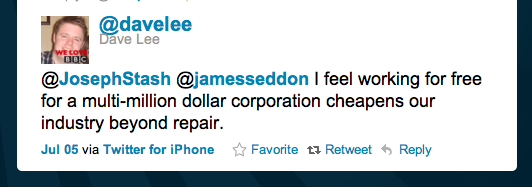If you’re reading this as a final year journalism student, you’ve probably just finished your course. It’s a good feeling. After a few years of practicing, preparing and, indeed, pretending, you’re now free to be a real journalist in the real world.
If you’ve done it right, you’re being described by your peers as one to watch for the future: A real prospect – the prodigy that’s heading places. Everyone wants to work with you.
And then you graduate.
Overnight, you turn from a young up-and-comer to an inexperienced, untested and – if you’re not careful – unemployable journalist.
Why the change? Well, firstly, you now cost money. No longer can you put on a big smile and throw yourself into your work in exchange for little more than a satisfying “well done” from the news desk. Secondly, all those already in the jobs you want have been on the very same journey. They were all described as “budding journalists” once. They’re you, but older, better, and more experienced.
Frightening, isn’t it? But don’t worry. You have something up your sleeve: momentum. Keeping that momentum until you land the elusive first job is the key to short and long term success.
Remember that editor you did some great work for over the Easter holidays? He probably remembers you. He would probably recognise you in the street. But he won’t next year when another sprightly young journalist turns up on his doorstep offering free work. So strike while the iron’s hot.
Think of all the people you have ever worked or drank with. Check in with your tutors – many know what the local industry landscape is like through social connections – and make everyone you know on earth fully aware that you are a journalist looking for work.
Keep track of your coursemates. Without sounding cruel, their struggle will spur you on further. Or, on the other hand, some of them might strike it lucky and get a quick job themselves. All it takes is one friend within a publisher or broadcaster to spot a vacancy, pass on your CV and you’re one step closer to a done deal.
Cash in all those editors you met along the way that invited you to keep in touch, or gave you their card. Most of them will have just been acting polite – but you’re bound to have stuck in the minds of at least a few of them. Even if you didn’t, being at the right place at the right time can be all it takes to get a set of shifts on a newsdesk.
While it’s easy to be dazzled by your big companies – your BBCs and Guardians – it’s well worth remembering that you may make a better name for yourself working for a tiny publication where they’ll be relying on you to innovate and experiment. That’s where you can really make your mark. Keep in mind that this stage it’s about the job, not the publication. If you’re really lucky, both will be great.
These approaches could see you in a job within a month. Or three. Or a year. Perhaps two. Truth be told, none of these methods are a surefire way of getting a job, and a big part of getting that first job in journalism is about preparing to be unemployed. Maybe for a very long time.
It’s a horrible feeling. On the worst days it feels like you’ll never even have a job, let alone one remotely related to journalism. But that’s where an unexpected luxury of journalism comes into play: you don’t need work in order to be working. Unlike, say, an out-of-work plumber who needs a customer’s pipes to ply his trade, the dole-friendly journo can do so many things.
Fill your days with productive activity. There’s only so much time per day you can devote to job-searching – so apply yourself during your down time to equip yourself with even more knowledge. You’ve really got no excuse not to start a blog. Hyperlocal is all the rage – and forever will be, let’s not forget – so set something up for where you live and get started.
If you’re really good, you may even discover that through the process of unemployment you will end up employing yourself.
Or, after all that hard work, you’ll finally get that phone call or email that heralds the beginning of your career.
Until then, though, prepare to feel useless, depressed and deflated. It’s an unrelenting test of your resolve, and many around you won’t make it. But consider it a quality control mechanism. When you do eventually get that job, you’ll want everyone around you to be as determined as you are.
